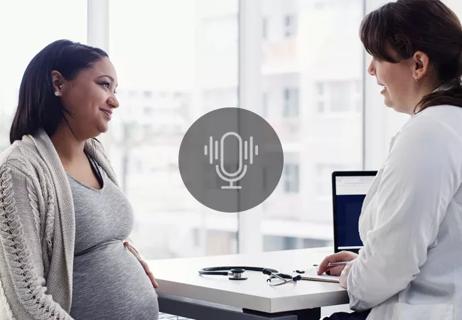Comparing strategies for cesarean prophylaxis with penicillin allergy

To help optimize post-operative outcomes, patients undergoing a cesarean delivery typically receive a prophylactic antibiotic as standard of care.
Advertisement
Cleveland Clinic is a non-profit academic medical center. Advertising on our site helps support our mission. We do not endorse non-Cleveland Clinic products or services. Policy
“The C-section rate in the United States is roughly one in three,” says Maeve Hopkins, MD, a physician in Cleveland Clinic’s Obstetrics and Gynecology Institute. “Reducing the risk of post-operative wound infection is an important part of keeping these patients healthy, giving them the best outcomes and keeping them with their families.”
In 2022, the American Academy of Allergy, Asthma and Immunology (AAAAI) updated its Drug Allergy Practice Parameter to de-emphasize skin allergy testing compared to drug challenge for a majority of patients who have been labeled with penicillin allergy. Dr. Hopkins and Margaret Kuder, MD, a physician in Cleveland Clinic’s Department of Allergy and Clinical Immunology, conducted a study to evaluate the cost-effectiveness of incorporating the practice parameter for cefazolin cesarian prophylaxis(i.e., administering cefazolin routinely without prior testing) versus referral for penicillin allergy testing.
Cleveland Clinic obstetricians traditionally referred pregnant women with penicillin allergies for allergy testing. “The vast majority of patients who are listed as penicillin allergic will pass an allergy test; they were inappropriately labeled. The new guidelines allow us to administer cephalosporins to more patients without allergy testing,” says Dr. Hopkins.
While this has benefits from an obstetrics standpoint, she sees broader advantages to allergy testing.
“Getting women into the pipeline for penicillin allergy testing is a good opportunity to de-label patients appropriately so they can get better antibiotic treatment not only during their intrapartum course or after C-section, if needed, but also later in life,” says Dr. Hopkins.
Advertisement
She and Dr. Kuder pursued the study to better understand that while penicillin allergy testing has a cost, over the lifetime of a patient it may be more cost effective than not conducting the testing.
The physicians used a decision analytic model to compare the costs and effects of each strategy for cesarian prophylaxis with penicillin allergy:
The costs they considered included allergy testing, antibiotics and complications, and the effects included testing compliance, cefazolin reactions and de-labeling penicillin allergy.
In the base-case, incorporation of the AAAAI practice parameter was the choice strategy, with the mean cost of $283 compared to $588.However, when incorporating the estimated lifelong cost of penicillin allergy into the decision model, referral for penicillin allergy testing becomes the dominant, cost-saving strategy, with mean cost of $1,367 compared to $4,755.”
PAT helps ensure that penicillin-allergic patients receive appropriate peri-operative prophylaxis as well as suitable medical treatment throughout the remainder of their lives.
“Having that information is important for the lifelong health of pregnant women, and it can save patients – and healthcare systems – costs associated with penicillin allergies,” says Dr. Hopkins.
__________
Dr. Hopkins presented a poster on the cost-effectiveness study at the Society for Maternal-Fetal Medicine’s Annual Pregnancy Meeting in February 2024. Her published journal articles on antibiotic use in cesarean delivery including the following:
Advertisement
Harris BS, Hopkins MK, Villers MS, Weber JM, Pieper C, Grotegut CA, Swamy GK, Hughes BL, Heine RP. Efficacy of Non-Beta-lactam Antibiotics for Prevention of Cesarean Delivery Surgical Site Infections. AJP Rep. 2019 Apr;9(2):e167-e171. doi: 10.1055/s-0039-1685503.
Hopkins MK, Dotters-Katz S, Boggess K, Heine RP, Smid M. Perioperative Antibiotic Choice in Labored versus Unlabored Cesareans and Risk of Postcesarean Infectious Morbidity. Am J Perinatol. 2018 Jan;35(2):127-133. doi: 10.1055/s-0037-1606187.
Advertisement
Advertisement

Research may offer family-planning insights for those with the condition

Surveyed residents say they get little or no nutritional training

A discussion of special care considerations before, during and after pregnancy

Why timely screening and treatment are needed

Prescribing eye drops is complicated by unknown risk of fetotoxicity and lack of clinical evidence

ACOG-informed guidance considers mothers and babies

Essential prescribing tips for patients with sulfonamide allergies

Largest study examines factors affecting asthma exacerbations during and after pregnancy